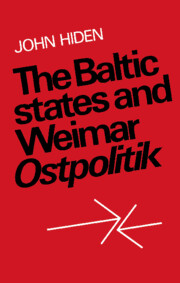Book contents
- Frontmatter
- Contents
- Introduction
- PART I THE POLITICS OF PEACEMAKING 1919–20
- PART II TRADE AND FOREIGN POLICY 1921–3
- PART III WEIMAR REVISIONISM AND BALTIC SECURITY 1923–33
- 5 Randstaatenpolitik
- 6 The politics of arbitration: Locarno and the Baltic
- CONCLUSIONS
- Map
- Tables
- Abbreviations
- Notes
- Bibliography
- Index
- Frontmatter
- Contents
- Introduction
- PART I THE POLITICS OF PEACEMAKING 1919–20
- PART II TRADE AND FOREIGN POLICY 1921–3
- PART III WEIMAR REVISIONISM AND BALTIC SECURITY 1923–33
- 5 Randstaatenpolitik
- 6 The politics of arbitration: Locarno and the Baltic
- CONCLUSIONS
- Map
- Tables
- Abbreviations
- Notes
- Bibliography
- Index
Summary
In recent times a growing understanding of the hesitant and erratic development of early Weimar–Soviet relations has made it harder to sustain the argument once advanced, above all in the works of British and American historians, that the Rapallo treaty signified a German–Russian ‘community of fate’ or ‘unholy alliance’. An integral part of that explanation was the implicit threat seen in the Rapallo ‘partnership’ to the very existence of the border states situated between the two powers. Such a view was found particularly in earlier studies of ‘Poland between East and West’, which analysed the diplomacy of Weimar–Soviet relations almost exclusively in terms of a dual pressure from the two great powers. Less attention was given to the evidence suggesting that the relationship between Germany and Russia continued to be problematic after, as before, Rapallo. To be fair, Germany's military and political leaders in the 1920s did recognize with satisfaction that the Rapallo treaty heightened the sense of insecurity of the Polish leaders, whose state's borders remained a major target for Weimar revisionism. The anti-Polish invective in German public life after 1918 makes it possible to see at first glance why historians were so tempted to draw parallels between the Rapallo agreement and the Nazi–Soviet non-aggression pact of 1939. The manifest difference between the two treaties is, however, that the latter was a prelude to a physical assault on Poland and the Baltic. To infer by linking the two pacts that 1939 was the logical outcome of 1922 is seriously to distort our understanding of the nature of Weimar Ostpolitik.
- Type
- Chapter
- Information
- The Baltic States and Weimar Ostpolitik , pp. 119 - 141Publisher: Cambridge University PressPrint publication year: 1987



